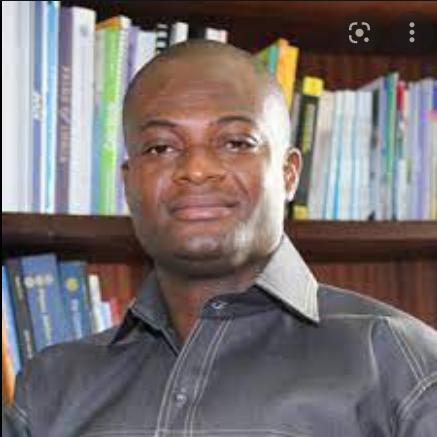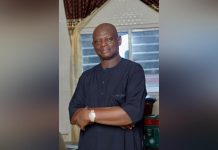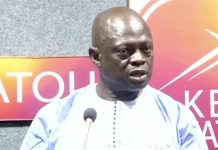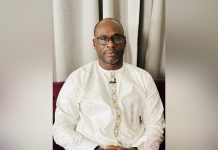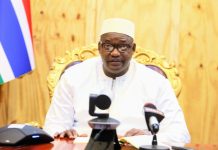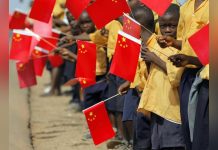Africa-Press – Gambia. Looking Backward
I have said before that as I grow older, I have become more of a storyteller. Permit me, therefore, to open this conversation with a story told in a satirical piece, The Blinkards, by Kobina Sekyi more than a century ago. It is a story of a character, Mrs Borofusem, a semi-educated woman, who returns to her native Fantiland in Ghana, after a short stay in England. Borofusem is a Fanti word for “English ways”. It describes the character of one who imitates the Whiteman and his ways. “We have gone to England: so we must do English things. English things are nice.” she says.
Even more illuminating are the words of Okadu, another character, who is completely “dazzled by all the flimsy foreign frippery”, but who, unlike Mrs Borofusem, never crossed the stretch of the sea that lies beyond the reach of his eye view. “I speak English to soften my harsher native tongue. It matters not if I often speak the Fanti wrong, I’m learning to be British and treat with due contempt the worship of fetish, from which I am exempt… all native ways are silly, repulsive, unrefined. All customs superstitious, that rule the savage mind.”
The story unfolds, revealing the obvious consequences of blind mimickry of European culture that, “like a dreaded disease seeps through the pores of (the African way of life) and ravaging it beyond repair.” Mrs Borofusem turned out a lost woman, seeking meaning and identity in her own native Fantiland. She did the inevitable, albeit reluctantly, by reconciling herself to the African values she had earlier viewed with open indignation.
The final remarks of Mr Borofusem instructively sum it all. “Our ways and our things suit our climates. If only we would follow the customs they left us a little more, and adopt the ways of other races a little less we should be at least as healthy as they were.”
Perhaps, Sekyi’s goal in writing this play is not to entertain by depicting the follies in excessive Europeanisation, but to instruct and to provoke debate on major socio-cultural problems that have long glared the continent. His is a strong warning against the total confusion of all that is good with all that is European or American.
It is no secret that the average “educated” African has very little respect for the culture and institutions that are brewed from the African pot. It is this folly which has produced a generation of what Nana Kwabena Nketsia, an illustrious Chief in Ghana, has called the “miscultured African”, a useful adaptation of Fanon’s Black Skin, White Masks. In these days of masking-up, this figure of speech should be all the more illuminating: the “white” is a “mask”. It is not us. It prevents others from seeing our real and true selves. And it protects us from the diseases of the other, hopefully.
The story of The Blinkards finds expression in the African system of governance practiced over the last quatre century in Africa, a system largely influenced by the Western theory of constitutional democracy. The story of African experimentation with Euro-American constitutional democracy, in many respects bears the marks of The Blinkards. But unlike Mrs Borofusem, Africa did not go to Europe or America; Europe and America came to Africa and stayed. Nketsia blames the African educated elite — the Mrs. Borofusems — for succumbing to intellectual and cultural enslavement which inhibits any meaningful attempt to adopt or adapt their indigenous heritage. In this, he follows Freire in his book Pedagogy of the Oppressed, where he cautions that liberation by the oppressed should not be about replacing the oppressor and implementing their structures; instead, it should be about a revolutionary transformation of reality.
Yet, Africa has done the opposite. In the words of Damptey, Africa “has implemented a political system that has roots in colonial exploitation, thus our leaders have replaced the oppressor by internalizing the image of the oppressors within themselves.”Struck by such identity crisis and schizophrenia, the nostalgia for the past has never been lost on the average African. As Owusu-Sarpong observes, the strong belief in the need for a cultural renaissance of Africa, launched in the 1930s by the Négritude poets of francophone West Africa (Léopold Sédhar Senghor, David Diop, Bernard Dadié) and of the Black diaspora (Langston Hughes, Richard Wright, Léon G. Damas, Aimé Césaire), has gradually permeated all levels of contemporary African societies.Beyond this fundamental literary and political movement of the pre-independence era, a profound awareness of the importance of the revival of indigenous African values is now widespread amongst the people of Africa. On this score, many scholars have argued that the only way African countries can have a prosperous future is to develop a political system based on their indigenous practices that serves its citizens.
The message of the play is pretty simple to grasp, we must not swallow, hook, line and sinker everything Western or foreign. It is, perhaps, an invitation by the author to us, to deliberate on the need to preserve some of our cultural heritage, values and traditions. The author was a proud African, and even though English trained, remained faithful to his native culture and was critical about the incursion of foreign traditions and values into Africa.
The Death of Western Liberal Democracy
On July 4, 2019, when I delivered the Keynote Address at the Annual Conference of the Sierra Leone Bar Association, I said the following: “Politically, we are witnessing the death of Democracy and Good Governance and the rise of dictatorship and a new populism all over the globe, with the traditional democratic frontiers, the United States…and Great Britain leading the pack. Economically, we are experiencing accelerated extractivism, as the G 20 countries continue to pillage every imaginable resource from poorer countries – human, material, cultural, technological; whilst killing, maiming, threatening, starving, corrupting, anyone in the line of the resources. Socially, the world is so divided that everyone is looking over their shoulder to see if their neighbour is about to throw a bomb or otherwise harm them; and nations are so scared of one another they now parade military tanks, flyovers, and fireworks at their independence parades. Technologically, we are so screwed up, we use it to fight wars, rig elections to subvert the authentic choices of the people, and steal from each other. This is “the world we live in”.
No matter how much we pretend, and no matter how far we try to sweep it under the carpet, the Liberal Democratic Model is exhausted and almost dead. That Model, the dominant Model in our time for getting any country out of poverty and unto a path of sustainable development and keeping it there, will be no more by 2020; yes, by next year. As Vladimir Putin told the Financial Times at the Kremlin exactly a week ago today, “The Liberal Idea Has Become Obsolete”, having “outlived its purpose”. Putin is one hundred per cent right, but for completely different reasons from those he espoused in the interview.
This was almost three years ago, and I very believe same to be truer today.
Today, after many years of experimenting with Western theories of governance, we still depend on Western aid and support. Of what use, is a system, if it cannot help us provide the basic needs for our people without aid, support and grantsLike Mrs Borofusem, we must be prepared, no matter how reluctantly, to retrace our steps. For some reason, however, the urge to retrace our steps has not gained much currently in the discourses around the most sublime aspect of African governance – the making of Constitutions. Nketsia comes close to the point when he suggests that Africans should consider modernising indigenous African governance structures that will bring back the epoch of living the Constitution, as opposed to abiding by the Constitution.
History has taught us that throughout human civilisation political ideologies have often been grounded on historical and cultural footings, and are thereby culturally based. Thus, it is safe to say that culture largely defines political systems and the culture and history of a people determines what political structure is best for them. To borrow from Ahmed Sekou Toure, “every society has its own culture and every culture its own values of civilisation.”1
Human civilisations anywhere the world over thrive by adapting to changing human dynamics. As a people, therefore, it is okay to learn the little things from others that add value to what we have, but in so doing we must be careful not to ditch that which is uniquely ours, nor allow it to be washed away by time, while we play ourselves to near extinction in trial and error with all that is not ours. Like Sekyi insisted, society is an organism, living, growing, developing, evolving. It evolves healthily only if it reacts correctly to the stimuli from its changing environment. But in that process, it never abruptly replaces whole limbs with borrowed ones, still less annihilates its whole self. 2
African constitutions, from which the Rule of Law springs, carry at their core, in their spine, and within their DNA, Euro-American principles and values, swallowed, sometimes hook, line and sinker. That is the problem.
At their core, African constitutions contains the following incidents of Western-Liberal constitutional-democracy: Two-party democracy, euphemistically called “Multiparty Democracy”; Vote–buying, christened “Electoral Democracy”; the Rule of the Powerful, nicely styled “Rule of Law”; Executive Dominance, called “Separation of Powers and Checks and Balances”; Judicial Activism, Adventurismand Populism, named “Judicial Review”; and sporadic and tokenistic overtures to subalterns, dressed up as “Constitutionalism”.
Perhaps the greatest evidence of the inappropriateness of this unproductive constitutional mimicking is how African constitutions remain political documents, rather than developmental documents. On a continent where the sustenance of a constitutional order is directly tied to its capacity to deliver economic development and social progress, constitutional texts and practice continuously push Economic, Social, and Cultural Rights (ESCRs) and Directive Principles of State Policy (DPSP) to the realm of “unenforceable” rights.
And so, the first point I seek to make in this lecture is that we must identify and isolate the key elements of Western-Liberal democracy that populate the interstices of African constitutions and preside intelligently and methodically over their collapse.
Democratic Reversals
From the Western Sahara through the heart of Equatorial Guinea to the Horn of Africa, there is a tragic retrenchment of democracy, mimicking what appears to be a global trend, led, remarkably by the U.S and the UK, but also by Poland, Hungary, Turkey, and Latin America-with Venezuela as a striking example. According to Freedom House, the year 2017 marked the 12th consecutive year of a global decline of democracy. Even American democracy is in a precarious position, as it failed to achieve the most basic of democratic prerequisites, a peaceful transition of power in January 2021. A study by researchers in Vanderbilt University in 2021, showed that 41 per cent of Americans are willing to tolerate a coup 3. This is worrying. Across that country, legislatures have enacted an unprecedented number of laws that restrict access to the ballot box, such as cutting the number of days of early voting, restricting the drop-off locations for absentee ballots, and even banning the provision of food or water to people waiting in line to vote.
By 2019, democratic trends further reversed, and there are now fewer democracies in Africa than was the case 20 years ago. Notably, West Africa, previously commended as a trailblazer region, has seen serious backsliding as Mali, Chad, and very recently, Guinea experienced military coups. Burkina Faso followed swiftly and then the failed coup in Guinea Bissau. And major controversies have arisen about the candidacy for re-election of the incumbent president in Côte d’Ivoire. The Central Africa sub-region remains stuck with the highest concentration of autocratic regimes, with the three longest-serving presidents in the world in Equatorial Guinea (41 years), Cameroon (38 years), and Congo-Brazzaville (38 years). There have also been coups and attempted coups in several African countries such as Sudan and DRC. Huntington observes that key among the factors orchestrating democratic reversals is the snowballing effect. This does not bode good.
Let me make the data more graphic: Over the last decade, the African continent has recorded over 20 successful and attempted coup d’états. There was a coup in Niger and attempted coups in Guinea Bissau and Madagascar, all in the year 2010. In 2011, three coup attempts were made in the Democratic Republic of Congo, Niger and Guinea Bissau. 2012 recorded an increase in the number of coup-related incidents, with the Malian coup and its subsequent counter-coup attempt, the Ivorian coup attempt, the Malawian constitutional crisis and the Sudanese coup attempt.In 2013, the number rose even more. There were attempted coups in Benin, Eritrea, DR Congo, Comoros and Chad, with two coup attempts in Libya and successful coups in Egypt and Central African Republic. 2014 saw four coup attempts: one attempt in Lesotho, one in the Gambia and two in Libya. In 2015, Burundi and Burkina Faso became the next in the ever-growing list of countries besieged by attempted coups. 2016 saw more of the same: coup attempts in Burkina Faso, Libya and the Gambia. In 2017, there was the unforgettable coup in Zimbabwe and an attempted coup in Equatorial Guinea. 2019 recorded two coup attempts in Gabon and Ethiopia, and a successful coup in Sudan.
The year 2020 recorded one coup in Mali and an attempted coup in Central African Republic. Last year In 2021, things did not get any better: there were coups in Mali, Guinea, Sudan and a self-coup in Tunisia. There was also an attempted coup in Sudan prior to the one that succeeded. This year, 2022, less than quarter-way through the year, we have already recorded three political uprisings in the form of attempted coups in Guinea Bissau and DR Congo and a successful coup in Burkina Faso.
Unfortunately, it gets worse, because even countries that appear to be politically stable are not so in reality. Countries like Nigeria, Liberia and Ghana are slowly going downhill when it comes to upholding democratic principles. Behaviours such as the illegitimate removal of constitutionally protected officers from their posts, suppression and repression of journalistic freedom and freedom of speech, and interferences in court processes for micro and meso level political agendas are just a few of many destructive behaviours that will result in the inevitable death of democracy on the continent.
The Economist Intelligence Unit’s Democracy Index has noted that more than 50 per cent of the countries in Africa are authoritarian regimes and only two are full democracies. These figures may come as a shock to many but in hindsight, it is rather unsurprising considering the string of coup d’états that have inundated the continent in recent years. Africa has thus become increasingly, a coup d’etat hotspot with about 90 per cent of the coups in the world in the last five years taking place in Africa.4
While coups may be the wrong course of action to take in attempting to effect change in a country, they are more often than not the effects of poor governance and abuses of power by ruling governments. One such abuse of power is what is termed as “third termism”. This arises where a sitting president wishes to stay in office for longer than the designated two terms. In fact, since the early 1990s, 24 presidents in Sub-Saharan Africa have set talks in motion in attempts to prolong their stay in office. In 15 countries, presidents initiated constitution amendment processes to that effect. Out of these 15 cases, 12 succeeded: Burkina Faso, Burundi, Cameroon, Chad, Gabon, Guinea, Namibia, Niger, Rwanda, Senegal, Togo and Uganda. The remaining three failed: Malawi, Nigeria and Zambia.
The dramatic turn of these events resurrects the various weaknesses that are characteristic of African states and the need to re-evaluate our constitutions.
The second point I seek to make in this lecture is that the current democratic reversals all over the Continent, are natural developments from constitutions that that are not ours and that are intrinsically problematic to the African situation, world view and cosmology.
Kernels of Indigenous African Constitutionalism
There is a retained measure of peculiarity of identity in African constitutions which is largely traceable to our unique experiences as a people. First is the recognition of customary law as a source of law and second is the retention of the institution of chieftaincy and the system of traditional constitutionalism associated with it.4
It appears that we can only make progress as a people, if we develop our political systems, rooted in indigenous African customs and standards that serve the needs of her children.
Contemporary Western-Liberal democracy is characterised by a form of radical individualism, insulated from the social understandings of human nature.5 This is completely un-African and incapable of forming the basis of nation building in the African context.
It is significant to note that the key opposition elements to the project of a new Constitution in Ghana, for example, in 1992 did not forward any argument on the africanness or indigeneity of the draft constitutional text. In fact, they took as a given, the fact that the Constitution would be modelled along the tenets of those of their colonial masters. These included the Ghana Bar Association and the Catholic Bishops Conference.
It was only when the butchers and hairdressers were allowed into the room that real sense prevailed. Throughout the constitution-making process, perhaps the most contentious questions that generated so much heat in the political space were two. The first was on the place of the economic and social rights or what may be conveniently called the Directive Principles of State Policy in our national constitution and the second question bordered on the system of government — pro-Western or pro-traditional.
President Rawlings and his team appeared clear in their initial choice that they did not favour multiparty democracy, although they indicated that they had an open mind on the matter. Indeed, as recently as 2016, while addressing a durbar at Tadzewu in the Volta Region to mark the mini-Hogbetsotso festival of the people of Anlo, the late Mr. Rawlings, who was President then, re-echoed these earlier sentiments in his speech as follows:
“I have stated on several platforms that we adopted the language of the West without its integrity. We have used the English language as a symbol of authority and power but not as a symbol of respect and integrity. In the same vein, we have adopted democracy from the textbook without recognising and appreciating the intrinsic values of democracy in our own culture. The West is today getting a taste of the weaknesses of multi-party democracy that we have to put up with in our part of the world. While our old traditional culture of democracy was able to contain such weaknesses, the Western multi-party democratic practice appears almost incapable of containing corruption in its various forms. We have adopted the worst out of the West and used it to pin down and suppress the good qualities in our culture”.6
Rawlings hoped to adopt a political system influenced by positive aspects of both Western democracy and our traditional governance. By pursuing this tangent, Rawlings would have bravely mixed the sleepy informal traditional sector with the hugely awakened formal ex-colonial neo-liberal Western democratic orthodoxy, that would have brilliantly opened up the vast indigenous and informal sector for fuller progress and given a better sense of inclusion and progress for the average Ghanaian. In a sense, the average Ghanaian would have owned Ghana’s democracy and helped, in a sense, a dispersal of democratic values to all corners of Ghana, driven by their indigenous traditional values and norms, and not values subscribed to by a few elite. These intentions, as it turned out, did not materialise as clearly made manifest by the political system eventually adopted in 1992.
The result: in Ghana today, as in all of Africa, we do not live the constitution, we only try to abide by it.
The third point I would like to make in this lecture is that we need to revisit the attempts that were made during the various processes of constitution making in Africa and revive the debates on indigenous African traditional constitutionalism that took place then, as a pathway for returning to authentic African constitutionalism.
“Critical Sankofaism”
A constitution is a cultural product which reveals the character and ethos of a community.7 The sad truth remains glaring. Our constitutions, as Nana Nketsia asserts strongly, cannot be taken to be “derived from an indigenous African cultural reality.”8 To him, the whole constitution is a revelation of what W. E. B. Du Bois perceived as: “double consciousness, this sense of always looking at one’s self through the eyes of others, of measuring one’s soul by the tape of the world that looks on in amused contempt and pity.”9
The idea of people being the government, provides the ontological framework for ensuring people live the constitution as opposed to abiding by the constitution, in Nketia’s words. Thus, the question then becomes, as Tiky asked, how does Africa build a modern democratic political system that reconciles volition and communal determinism?10 The answer seems to lie in what Gyekye calls “critical sankofaism”.11 This is when one approaches their traditional past with critical eyes to select those elements that could be adopted for one’s present life and could also be helpful to building a better life in future.12
This idea of a cultural revolution that is indigenous to Africa, and is the basis for building a new political system, is the solution to the problems of unconsolidated democracy, bad governance and underdevelopment.13
There is still a zone of twilight that African constitutions may one day find identities of their own. It is not a completely lost situation yet. Indeed, most of our constitutions contain the seeds and incipient criteria for really African constitutions.
At this point, you are entitled to ask how this may be done in practical terms. There are three broad ways of Africanising our constitutions: through substantive institutions created in and by those constitutions; through language; and through the process of making the constitutions. It is to these seeds and incipient criteria, that we shall now turn, as I conclude my paper.
The first note of substance is the recognition of the place of traditional governance in our constitutions and also of Customary Law. The second note of substance is the constitutionalisation of a National Development Plan. Closely related to the second note is the place of Economic and Social Rights in African constitutions. As the Ghanaian constitution provides in part:
“The state shall in particular take all necessary steps to establish a sound and healthy economy whose underlying principles shall include:The recognition that the most secure democracy is the one that assures the basic necessities of life for its people as a fundamental duty”.
As one of the midwives of Ghana’s 1992 constitution cautioned: “we should not be taken in completely by the western media which ascribed the people’s wrath mainly to denial of freedom.” What underlines the real frustration of the people has a lot to do with the “lack of jobs and other necessities [which] were mentioned by some demonstrators but [which for some reason] was not highlighted enough [by the western media]”.14
There is enough of these protests and agitation happening around us, if only we care to look. It is happening in Nigeria. The lesson is simple: “that important as human rights, democracy and the like are, they cannot replace food, shelter and the other simple necessities of life.”15
Another way of making our constitutions carry an African identity is through language. This may be done in two stages. The obvious one is to write the constitution in African languages, the people’s own languages. But this is rather too simplistic an approach to dealing with the problem. The second stage of language is to use African concepts like Sankofa,16 Ubuntu,17 and so forth to convey the values and visions that imbue African constitutions.
According to Nana Nketia, understanding and appreciating the Chieftaincy institution, for example, requires that we understand first of all the concept of a “Chief”, away from construction through the prisms of foreign imposed concepts. As such, the Dalai Lama is the Dalai Lama, and the chief a chief, any reference or rather interrogation as to whether a chief is a King smacks of western imposition and fails to register with indigenous ways of thinking.”18 We need to appreciate these concepts only through indigenous cultural frameworks, if they are to be truly appreciated and the use of African concepts is the way to do this.
Finally, to produce the types of constitutions that will deliver the Africa we want, we must start by addressing the fundamental weaknesses in the constitution making process. As the grundnorm from which all other laws are born, and by which their validity is tested, it is imperative that the process by which the constitution is gotten is taken very seriously.
That process must be rooted in the understanding that the Constitution is not in itself an end but a means to an end; resulting ultimately in the pursuit of happiness and the guarantee of human development in its truest sense and in all of its manifold manifestations. The entire constitution making process cumulatively, must “move the Constitution from a political document to a developmental document, shifting from the politics of democracy to the economics of democracy, so that (Africans) may look at it as the source of a better life.”19
The starting fundamental principle or assumption should be that the constitution making process belongs to the people and they must therefore own it. This can be achieved through a methodology that ensures wider consultation with and the participation of as many people as possible. Consultation, people-participation and consensus building have the advantage of producing forward-looking constitutions that the people can relate well to and that are more easily accepted and defended. Consensus-building as opposed to majoritarian rule is an important African value we must return to.
In a typical African community, everyone matters; so are their opinions. Consensus-building ensures that voices, even of the least powerful, skillful, or known are heard and considered in decision making in governance. The latest Kenyan constitution making process offers us all a good example of this. So too is the Constitution Review exercise in Ghana that followed closely the Kenyan experience.
And so the final point I seek to make in this lecture is this: the kernel for the evolution of African traditional constitutionalism exists in our various constitutions and should be allowed to grow and evolve. The seeds and incipient criteria for a really African Constitution include substantive content; language; and the processes for constitution-making.
Conclusion
I have so far discussed the critical role of indigenous institutions to the evolution of robust constitutional identities on the African continent. In other words, how do we identify, isolate and integrate productive African traditional principles and institutions to modern African constitutions, in order to give them a distinctive African identity?
Many ideas and experiments on constitutional ordering on the African continent focus on how to achieve constitutional democracy and constitutionalism. The vehicles for these ideals are often named as multiparty democracy; free and fair elections; the rule of law; separation of powers; and more recently, human rights protections; judicial independence; decentralisation; participatory governance; and participatory development.
With the failure of third wave democracy in Africa, and a return to authoritarianism in many African countries, mimicking a global trend of democratic reversals, many are questioning the constitutional orderings that Africans continue to imitate from their former and current colonial masters.
I trace the failure of constitutional orderings to produce “the Africa we want” to a disregard of indigenous customary constitutionalism and governance practices, and a corresponding increase in unconscious mimicking of extraneous constitutional learning.
I illustrate the schizophrenia embedded in African constitutions and conclude that only a decolonisation of African constitutional law can lead to authentic African constitutional identities and “the Africa we want”.
In Africa today, democratic reversals, the narrowing of civic spaces, and in an increasing number of cases, the forceful overthrow of governments, means that a fourth wave of democracy and constitution-making is imminent and, in some cases, ongoing.
This quest for new constitutional orderings on the continent must engage with design and content questions that have subsisted for the last seventy-five years: the legitimacy of extant constitutional design; the possibilities for unearthing and utilising rehashed indigenous governance mechanisms; the propriety of options at independence that were not followed; the practicality of hybrid and variegated constitutional design; and the capacity of the new forms of constitutional design and content to deliver “the Africa we want”.
In my address to you today, I have attempted to contribute to the first two queries: the decolonization of constitutional architectures and the construction of an indigenous African constitutional identity that reflects authentic and productive African values.
This is the only way we can arrive at a true Rule of Law, in the terms of Diane Kalen- Sukra’s definition of “Good governance [as] the art of putting wise thought into prudent action in a way that advances the well-being of those governed”.
It is also the only way we can arrive at the point where Africans live their constitutions, rather than attempt to abide by them.
Footnotes
1. S. Touré, “The Political Leader Considered as the Representative of a Culture”. (BlackPast.org. 1959) https://www.blackpast.org/global-african-history/1959-sekou-toure-political-leader-considered-representative- culture/
2 H. V. H. Sekyi, The Blinkards: A Comedy and The Anglo-Fante—A Short Story (viii)
3 Id
4 Ibid at 36
5 D. I. Ray and P. S. Reddy, Grassroots Governance? Chiefs in Africa and the Afro-Caribbean. (University of Calgary Press, Canada 2003)
6 Monday, 31 October 2016
7 Nana K. Nketsia V: “The Constitution, Culture and Chieftaincy.” A paper presented to the Chair’s Expert Advisory Group on Culture set up by the Constitution Review Commission. May 12th, 2010.
8 Nana K. Nketsia V: “The Constitution, Culture and Chieftaincy.” A paper presented to the Chair’s Expert Advisory Group on Culture set up by the Constitution Review Commission. May 12th, 2010. Page 1
9 W. E. B. du Bois, Souls of Black Folk Chicago. (Fawcett, New York 1964)
10 L.M. Tiky, Democracy and democratization in Africa. Champaign, (Common Ground Publishing, Illinois 2014)
11 K. Gyekye, An essay on African philosophical thought: The Akan conceptual scheme. (Cambridge University Press, 1987).
12 Y. Lamptey, Critical sankofaism is the answer. TodayGh 2015. Retrieved from: http://www.todaygh.com/critical- sankofaism-is-the-answer-says-prof-gyekye/
13 L.M. Tiky, Democracy and democratization in Africa. Champaign, (Common Ground Publishing, Illinois 2014); K. Gyekye, An essay on African philosophical thought: The Akan conceptual scheme. (Cambridge University Press, 1987); N.K. Nketsia, African Culture in Governance and Development: The Ghana Paradigm. (University of Cape Coast Press, Cape Coast 2003)
14. K. B. Asante – Daily Graphic publication 23/02/2011
15 K. B. Asante – Daily Graphic publication 23/02/2011
16 Sankofa is an Akan proverb that literally means “Go back and get it.” It is a humble reminder of the need for the current generations to learn from those that come before them. It is a call to be mindful of the obvious flaws of the past so we do not step on the same rake, but even more that we are able to sift the wheat from the chaff and draw the useful lessons from history.
17 Ubuntu is Zulu for “I am, because you are” to wit, everyone’s life affects others around them. It has its origins traced to humanist African philosophy which is rooted in oneness of human community as a tool for societal progress.
18 Nana Kobina Nketsia V: “The Constitution, Culture and Chieftaincy.” A paper presented to the Chair’s Expert Advisory Group on Culture set up by the Constitution Review Commission. May 12th, 2010.
19 Report of the Constitution Review Commission: From a Political to a Developmental Constitution (2011) at p. 11 15
Raymond Akongburo Atuguba is Dean of University of Ghana School of Law.
This is the text of a lecture delivered a lecture delivered at the Faculty of Law, Open University of Nigeria, on Friday, February 18, during the International Grand Law Dinner, 2022 at the Lagoon Restaurant, Victoria Island, Lagos, Nigeria.
For More News And Analysis About Gambia Follow Africa-Press

